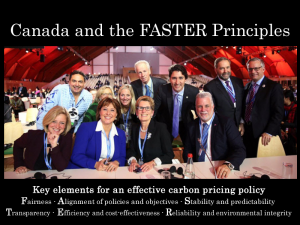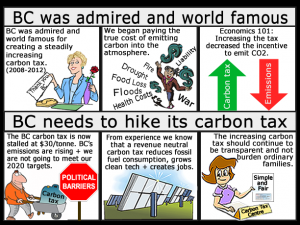Canada’s carbon pricing backstop policy is a form of carbon fee and dividend. In October 2018, after Prime Minister Trudeau explained how Canada’s carbon pricing plan would work, more people got on board: an Angus-Reid report found that while 45% of Canadians supported a federal carbon plan in July 2018, it had ticked up to 54% in October 2018. A silent majority of Canadians want climate action. A December 2018 Ipsos-Reid survey seems to bear this out — 75 percent of respondents said Canada needs to do more to address climate change. Pent-up Canadian desire for climate action was also uncovered in the September 2018 Ikea/GlobeScan study This trend is also supported by a global trend uncovered in February 2019 in a global Pew survey, that included Canada, that climate concerns are rising sharply around the world. When respondents were presented with a question which noted that many economists had offered a contrary view, namely that the impact of the tax would be too small to cause a recession, even more people (73% in Ontario, 74% across Canada) rejected Mr. Ford’s contention. Opposition to the carbon tax is highest in Alberta, but even there only 41% are set against the idea, which drops to 30% when the rebate is introduced. In Ontario, 34% support, 37% are open to, and 30% oppose the federal carbon tax. With the rebate, support jumps to 42%, and opposition drops to 22%. Other polling data to consider: In January 2019, Ontario Premier Doug Ford claimed the federal government’s carbon tax would cause a recession in Ontario, many economists disagreed. And it seems most regular people do as well according to a February 2019 Abacus poll.
In January 2019, Ontario Premier Doug Ford claimed the federal government’s carbon tax would cause a recession in Ontario, many economists disagreed. And it seems most regular people do as well according to a February 2019 Abacus poll. In the same Abacus poll, Canadian opinion about the federal carbon tax backstop reveals that 35% support the idea, 28% oppose it and 37% say they are open to considering it. When told of the idea that revenues would be rebated to affected households, support climbs by 9 points, and opposition declines by 6 points.
In the same Abacus poll, Canadian opinion about the federal carbon tax backstop reveals that 35% support the idea, 28% oppose it and 37% say they are open to considering it. When told of the idea that revenues would be rebated to affected households, support climbs by 9 points, and opposition declines by 6 points.












